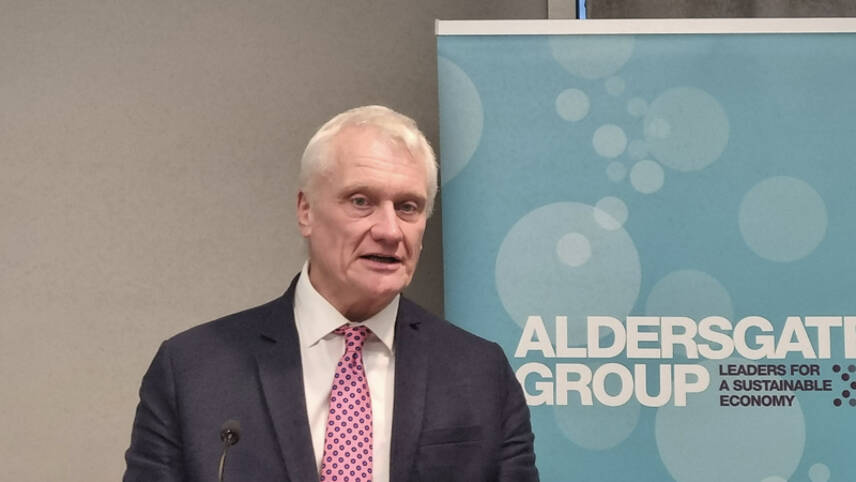Register for free and continue reading
Join our growing army of changemakers and get unlimited access to our premium content

Image: Sarah George for edie
Stuart, who has been the MP for Beverley and Holderness since 2005, was selected for his new Ministerial position last month. The Government has since kick-started a ‘net-zero review’, with Chris Skidmore MP, who is heading up the review, repeatedly stating that the UK will keep the 2050 date but explore different ways of delivery.
Despite this, there have been concerns about whether some of the decisions being made under Truss would undermine the UK’s net-zero transition. This week, there have been reports of plans to roll back the 2030 ban on new petrol and diesel cars and to limit solar developments on farmland, as well as plans to temporarily curtail profits from renewable power generators. And, later this season, there will be a new North Sea oil and gas licencing round.
Stuart was delivering the keynote speech for the Aldersgate Group’s latest event in London last night (13 October), and was asked by the Group’s honorary president Prof. Emily Shuckburgh how the oil and gas plans could be compatible with the UK’s net-zero transition. She also questioned the alignment of fracking with net-zero, given that the Committee on Climate Change (CCC) recommended keeping the moratorium in place.
The Minister said: “I think the answer is pretty straightforward. Our oil and gas, overall, has lower emissions than the stuff we import. We import some 75% of our fossil fuel needs right now.
“BEIS modelling to 2050 shows that we’ll be burning gas in 2050, even if we deliver net-zero. If you’re going to be using oil and gas all the way to 2050 and beyond – which we will in the net-zero transition – you need to, first off, use the stuff only where you have to use it, and with the lowest emissions around it.
“We’re going to be burning it, I think it’s perfectly green to be burning it, we can’t stop ourselves immediately.”
“We’ve got our carbon budgets, meaning we’re going to be producing and using less and less. We’re always going to be a net importer, meaning we’re not spilling into the global market. We’ve got a mature basin in the North Sea and we expect, even if these licences come up with us much as they possibly can, that the decline in North Sea production will be faster than what is needed globally.
“I think it’s entirely compatible. I don’t really see how anyone can think otherwise. But that’s not what I tend to read in the newspapers the following day.”
Earlier this month, Global Energy Monitor assessed the potential lifetime emissions of the largest UK North Sea fields likely to reach final investment decisions and/or gain development consent by the end of 2025. The finding was that these emissions would make delivering the UK’s forthcoming carbon budgets impossible.
‘Steadfast’ commitment
Stuart also had the opportunity to deliver a keynote speech, and he placed much emphasis on his desire for Liz Truss’s new Government to keep green economy ambitions at at least the level of the previous Government.
He said: “I asked the Prime Minister: What is it you want from me? She said: Accelerate. Accelerate what we do… offshore wind, onshore [wind], solar, nuclear. Accelerate on all fronts, because we need to. And we need to do so in a way that is enterprise-friendly, that harnesses – exactly as the Aldersgate Group has always done – our private sector strengths in finance, engineering, and so many other fronts. Without that, you’re just not going to be able to move at the speed required.”
Later in the speech, he added: “I should make absolutely clear today, near the beginning of my remarks, with a new Prime Minister and new Government, that the Government’s steadfast commitment to delivering net-zero remains.
“The aftershocks from the Covid-19 pandemic and the war in Ukraine have led to strained geopolitics, threats to our energy security, soaring inflation, rising debt and rising food prices around the world. I know there are those who think these crises spell the end for net-zero, and the end for the Glasgow [Climate] Pact.
“I wholeheartedly refute that – not only because we must not allow that to be the case, but because these added pressures only underline the case for action, and action now. Net-zero is the solution to so many of the problems we’re confronted with today, including supporting economic growth. And it will help mitigate the challenges of tomorrow.”
“My message is that I believe ‘green’ and ‘growth’ actually go hand-in-hand.
“It is not a matter of whether we should transition to net-zero: it’s about how we get there. It’s not about the costs of decarbonisation: it’s about the costs of missing out on the huge opportunities that decarbonisation presents.”
With Truss having today (14 October) sacked Kwasi Kwarteng as Chancellor, it’s set to be a turbulent few weeks ahead for her administration.


Another baffling appointment of someone who has no experience of managing energy, climate change or any clue about net zero by the comments made above. We now have two clowns reviewing the net zero commitment as Graham Stuart (Cambridge degree (failed to complete) in Philosophy & Law) and Chris Skidmore (Oxford degree in Modern History) try to decide if Fracking or Oil & Gas extraction is the best way to tackle climate change. Maybe they should also review Drax power station, which is burning wood pellets made from pristine hardwood, illegally carved out of the Amazon rain forest and transported 7000km by diesel powered ships to Drax!